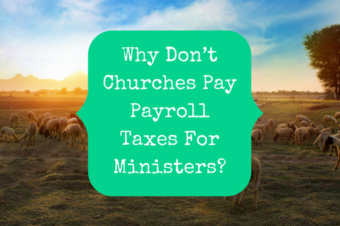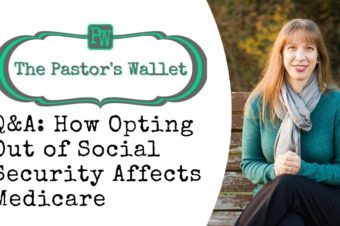
Unfortunately, pastors are sometimes given bad information regarding Medicare. This can lead to costly enrollment mistakes. If this has happened to you, there may be a way to fix things.
I recently heard from a pastor who was told by his local Social Security office that he was neither eligible for Medicare through his wife nor could he purchase it. This is terrible for two reasons.
First, that is just plain incorrect information. Any US citizen or legal resident who has lived in the country for at least 5 years and is age 65 or older is eligible for Medicare. How much they have to pay for it is determined by how long they have worked and paid into the system. Even pastors who have opted out of Social Security can get Medicare either through their spouse or by paying more for it.
Medicare Mistakes Are Costly
Second, following that advice can have very serious financial consequences for him. Every person has a 7-month window surrounding their 65th birthday in which to enroll in Medicare. If you don’t enroll during that time (unless you’re still working and covered by an employer-sponsored plan) you will be penalized. The penalty is a 10% increase in premiums for every full 12 months that you are late enrolling. And the penalty never goes away.
So, if that pastor doesn’t enroll in Medicare because his Social Security office won’t let him, he will be penalized. His premiums could be 10%, 20%, even 30% higher depending on how long it takes him to figure out his mistake and get someone to let him enroll. Now, does that seem fair?
What Is Equitable Relief?
Unfortunately, his is not a unique situation. It seems that a lot of people fail to enroll in Medicare on time based on bad advice from Social Security office employees. So much so that they created an administrative program to help those people.
The “equitable relief” program allows you to request either immediate or retroactive enrollment in Medicare Part B, the elimination of your Part B penalty, or both. It was designed specifically for people whose failure to enroll was “unintentional, inadvertent, or erroneous,” and was caused by “error, misrepresentation or inaction of a federal employee or any person authorized by the federal government to act on its behalf.”
How To Request Equitable Relief
If you think you may be eligible for equitable relief, you need to write a letter to your local Social Security office. Explain what happened and who gave you the bad information; whether it was over the phone, at your local Social Security office or someone representing a Medicare private health plan. Be as detailed as possible and include in your letter:
- The dates and times you spoke to the person
- The person’s name, if you remember
- The outcome of the conversation
- If you want the elimination of your Part B penalty
- Whether you want your Part B coverage going forward or retroactively. If you are granted coverage retroactively, you will have to pay all of the premiums going back to when the coverage begins.
You can view a sample letter here.
Send your letter as certified mail so that you will receive a receipt. Also, make sure to keep a copy of your letter and anything else you send the Social Security Administration. Follow up with your local office a month after you send your letter. If you have trouble communicating with the Social Security Administration, contact your Senator or Congressperson for help.
Unfortunately, equitable relief is not a formal legal process and you have no formal rights regarding it, including the right to appeal. The Social Security Administration is not required to respond in a timely manner or send you a letter with their decision. However, many people have been granted relief through the process, so it’s definitely worth a try!
If you have experience with the Medicare Equitable Relief process, please tell us about it in the comments!



